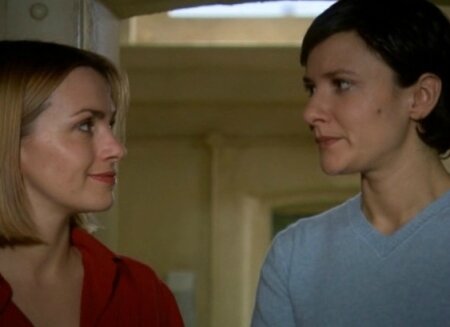DO OR DIE - 3-06
AU FEU
Réalisateur : Jo Johnson
Scénariste : Maureen Chadwick
Helen réunit les condamnées à perpétuité dans les cellules individuelles. Elle se débrouille pour faire muter Pam, une détenue jusqu'à présent toujours enfermée au niveau psychiatrique, à l'aile G. Tout le monde surnomme Pam "Pouding".
Les deux Julie trouvent un chat près des poubelles de la prison. Elles décident de le garder et le dissimulent dans leur cellule puis dans l'abri de jardin de Nikki. Malheureusement, le chat disparaît peu de temps après et elles accusent Pam. Quelques jours plus tard, Nikki le retrouve avec une portée de chatons.
Quelqu'un met le feu dans la cellule de Nikki. Elle accuse Pam mais Helen refuse de croire en sa culpabilité. Elle n'accuse personne sans preuve.
Helen s'implique réellement dans la réinsertion de Pam. Elle demande son aide à Karen et propose une consultation avec un psychiatre. Le psy diagnostique une schizophrénie et met en place un traitement adapté. Le comportement de Pam évolue de manière impressionnante et Helen parvient à la faire muter en prison ouverte. Elle met alors en doute le traitement du médecin de la prison et en parle à Simon, le directeur. Ce dernier vire alors le docteur incompétent.
Shaz rend visite à Denny, à l'hôpital. En entendant la voix de son amie, cette dernière se réveille. Quelques jours plus tard, elle regagne sa cellule.
Josh fait un stage pour devenir gardien. Alors qu'il apprend à se faire respecter et que Di lui explique les rudiments du métier, Shaz fait une réflexion concernant Crystal. Josh nie l'avoir revue mais Di demande des explications à Shaz et celle-ci lui avoue que Josh et Crystal se voyaient avant. Jalouse, Di accuse Crystal d'avoir volé la pendule destinée à Sylvia. Josh s'interroge et demande des précisions à Denny qui le rassure et déclare que Crystal n'y est pour rien. Le soir venu, Di suit Josh jusqu'à son domicile et découvre qu'il ne vit pas seul.
Jim invite Karen à dîner. Tous les deux se rapprochent. Seulement Jim semble avoir peur des détenues et être sur ses gardes. Il est agressif et commet des erreurs. Alors qu'il est seul avec Helen dans une pièce, il la harcèle sexuellement.
Bonne nouvelle pour les détenues "à vie", elles vont bénéficier de cellules individuelles au 3ème étage :
Helen: Right. So some of you will have to get packing today, 'cause all the lifers on G wing are moving to single cells on the threes.
Helen déménage également Pam au 3ème au grand regret de Fenner qui en parle à Karen :
Karen: I'm sick of your anti–Helen Stewart campaign. It makes you sound like Sylvia.
Helen se rend dans la cellule de Nikki alors que celle-ci caresse l'exemplaire de Sophie's World qu'Helen lui a offert il y a si longtemps :
Helen: Nikki. Can I ask you to do me a favor?
Nikki: [smiling coyly] Yeah.
Helen: Can you introduce yourself to Pam Jolly and take her down to lunch with you? She's gonna need a lot of support. She's very scared. And who wouldn't be, after what she's been through?
Nikki n'apprécie pas vraiment la demande d'Helen.
Nikki: She's a scary one.
Helen: So you agree with Jim Fenner? Listen, 12 years ago, Pam was at college, training to be a teacher. In less than a year she'll be eligible for parole. The whole time she's been in prison, I doubt a single person's tried to have an intelligent conversation with her. I'm just asking you.
Nikki: [sighing] All right. But you can't win 'em all, you know?
Helen: [sharply] What is that, a principle for action?
Nikki: No. It's just an "I care about you."
Helen invite Shaz à l'accompagner voir Denny à l'hôpital :
Nikki découvre ses livres calcinés :
Nikki: [cradling Sophie's World] First thing you ever gave me.
Helen: I'll buy you another copy.
Nikki: I warned you not to bring that fat head case up here. But you always know best, don't ya?
Helen: Everyone on this unit is a suspect, Nikki, including yourself. I'm not accusing anyone till I've got proof.
Dans le bureau de Karen, Helen essaie de défendre Pam :
Helen rencontre le psychiatre indépendant Dr. Thomas Waugh. Il flirte avec elle presque immédiatement :
Helen annonce à Pam qu'elle pourra bientôt aller dans une prison ouverte alors que Nikki arrive pour inviter Pam à venir jardiner avec elle
Nikki: Gotta apologize to you. You were dead right about Pam Jolly.
Helen: Well, you were right. I was puttin' my neck on the block.
Helen: I really feel I can change things now. [turning, then pausing] Nearly forgot. [takes out a new copy of Sophie's World] I know it's not the same, but ...
Nikki ouvre le livre où une inscription est notée : "Until we meet on the outside. -- H"
L'épisode se termine sur le coup de folie de Jim Fenner :
Dans le bureau des officiers, Jim lui tend le dossier qu'elle est venue chercher. Soudain, il la pousse et l'écrase contre l'armoire.
Fenner: Shall I show you what you really want?
Il glisse brutalement sa main entre ses jambes. Terrifiée, Helen réussit à se libérer et s'enfuit.
(Sources Captures et Dialogues : Afterellen.com)
ANALYSE DE L'EPISODE
Analyse de l'épisode en anglais par Richard B.
In an episode which focuses on the prison's treatment of an extremely mentally ill character, Shed's lightly effective storytelling also explores the less obvious complexities of madness. The episode depicts the difficulties of distinguishing between madness and normality, both in individuals' psychologies, and in communities and institutions, and the dangerous repercussions when characters fail to acknowledge and act on these differences.
Within the mad and maddening world of prison, the prisoners constantly strive towards a home-like normalcy. When Helen meets with Shell and Pam, Shell goes off on a rambling monologue about how G3 is like their street, the kind of street where one might borrow flour from one's neighbors. While this imagery is of course absurd (no one on G-Wing is doing any baking other than the kitchen staff), the impulse towards replicating a normal, neighborly society is evident. Tinker the cat also embodies this impulse, with the Julies falling for the chance to nurture a pet. Pets represent a metaphorical dividing line between an institution (no pets allowed) and a home. The Julies get their “neighbor” Nikki to help them create a home for Tinker in the potting shed, and for her trouble, Nikki gets bitten by fleas.
Getting bitten by fleas is the least of the repercussions for those who place trust where perhaps it is not warranted. Many characters experience lapses in judgment, or act against their better judgments. Nikki helps Pam on Helen's behalf, and takes care of Tinker; Helen trusts in Pam, and is sympathetic to Fenner at the end of the episode; Karen trusts Fenner over Helen; Josh doesn't see what Di is up to. These perceptual lapses upset the delicate balance of power between screws and cons, and also mean it takes very little for things to go seriously awry: various characters are unable to protect themselves when real dangers do occur. Prison is neither Shell's homey 'neighborhood' nor some big dysfunctional family: it's 'just prison', as Nikki told Monica in Series 1, episode 2. Sadly, attempting to behave as if it's anything like 'normal', or forgetting for even a moment who, or what one is dealing with, means the consequences are immediate—and often, severe. Shell's rambling monologue would be funny... if she hadn't just torched Nikki's cell, a crime she's never exposed as the author of.
Fenner's psychological struggles in this episode encapsulate the dangers of covering up or ignoring the realities of madness, madness of an individual, or madness of an institution. His 'tough it out' approach rings warning bells and contrasts with his earlier private emotional breakdown to Karen after his wife and children have left him—a far more healthy response to stress. He expresses his total horror of women suggesting that he has therapy (first Helen and then Karen) by describing therapy as 'giving in to the situation.' The post-stabbing trauma has cornered Fenner into revealing his fear of a therapist seeing into his mind, of exposing his mind at all.
Fenner refuses to relinquish control, to expose the turmoil beneath the surface, and Helen embodies the ongoing threat to his control. She is the symbol of everything in the prison system that is outside his control, that threatens his position and persona. Fenner blames Helen for two things: Shell being back from solitary, and Pam Jolly being on the wing. Rather than deal with his fears of death, or his fears of psychological exposure, Fenner tries to reassert his mastery through an act of violence, sexually assaulting Helen just at the moment when she expresses a small amount of sympathy for him. Helen, by defending Fenner in the specific instance of Shell's attack on him, has earned Fenner's undying enmity by not ridding him of Shell as a continued threat. Fenner's effort to maintain the normal surface provides impossible, and finally turns ugly—and dangerous.
Di's own version of madness provides a different angle on the intersection of madness and normality, because Di doesn't seem to be able to differentiate between the two. When she latches on to Josh, he sees her as a friendly assistant to his chance to become a prison officer, she sees him as her lover whom she is trying to draw into her deluded world. She is suspicious of his excuses not to socialize after work. When she learns of his romantic interest in Crystal, she spies on him after work and plants the seed of suspicion in his mind about Crystal taking Bodybag's clock, (a moment of extreme madness for Di, in terms of its total break with any solid reality), although ironically, her mad accusation happens to be true, reflecting the possibility for anyone, even someone as generally solid as Crystal, to have moments of mad behavior. Di's madness is both her obsessiveness and inability to recognize, the difference between her obsessions and normal human relationships and interactions.
In comparison to Fenner and Di, Pam Jolly emphasizes the other aspect of madness, where Pam's utter isolation from normal human interactions enables her to see some of the essences of truth which elude other characters. On the surface, nothing outside her confused perspectives of rosaries and visions make any sense, not even to the very puzzled (and out-of-her-depth) Helen who sees Pam as someone who is 'scared.' In fact, much of Pam's fear and paranoia are justified, particularly in the world of Larkhall where so many people are out to get her. Towards the end of the episode, Pam Jolly's visions cause her to hear what really is there: the cat in the potting shed. The coherence Pam demonstrates when talking to Dr Waugh, further emphasizes the clarity which can come from madness. Pam offers the theory that 'what is true is what someone believes' an adage which the other mad characters in this episode (Di and Fenner) seem to embrace as well.
Unlike Pam, the very person who should be able to distinguish between madness and normality has fallen into his own trap of misperception, too distant and uncaring to be capable of doing so. Dr No No reveals his incompetence in dealing with madness with his initial misdiagnosis of Pam Jolly as 'depressive' and his subsequent dismissal of her as 'criminally insane'—a diagnosis which Helen quickly and intelligently ridicules by pointing out its internal contradictions. If a person is insane, how can they demonstrate the awareness of right and wrong which is necessary for an action to be considered criminal? By distancing himself from the prisoners, by not seeing them as human (as when he ignores Shaz's question about when Denny will be well enough to return to the wing), Dr. No No prevents himself from being able to separate madness from sanity, disease from health.
Helen herself falls victim as well, to her inability to distinguish madness from normalcy. When she first brings Pam on to the wing, she's disregarding (or seemingly unaware of) the danger Pam might pose to herself and other prisoners: in her eagerness to see Pam rehabilitated, she's jumped the gun a bit, considering Pam to be a normal prisoner. She soon realizes Pam isn't a normal prisoner, and brings in a psychiatrist to have Pam fully evaluated. Helen's awareness leads to a cure for Pam, and a triumph for Helen. But that doesn't mean her ability to separate madness from normality is foolproof. At the end of the episode she makes a similar error interacting with Fenner. Her compassion—her moment of weakness in being concerned for Fenner, of all people, and her disregard of potential physical danger to herself—leads her to ignore the signals he's putting off. In this moment, she considers him a normal colleague, with whom she has a normal relationship. She doesn't back off from getting the file, and she's punished severely for her inability to differentiate.
In every case, the characters who are unable to separate normality from the madness of their situation wind up with very bad repercussions, either for themselves or those around them. The Julies try to take care of a pet—as if they live in a home, not a prison—and an innocent bystander, Nikki, gets fleas. Helen tries to help a schizophrenic inmate, and an innocent bystander, again Nikki, gets her cell torched. Nikki blames Helen—and takes out her anger on her--for her cell getting torched. Pam is severely beaten because the prisoners think she's hidden the cat. Helen tries to treat Fenner as a normal colleague, despite her huge personal distaste for the man, and is sexually assaulted for her efforts. In every case, the result of mis-treating a situation as normal which isn't results in some measure of physical violation.
(Source : www.badgirlsannex.com)
Lire la suite : BadGirls 3-07










/https%3A%2F%2Fstorage.canalblog.com%2F56%2F77%2F1179745%2F119607636_o.jpg)
/https%3A%2F%2Fstorage.canalblog.com%2F29%2F58%2F1179745%2F118642970_o.jpg)
/https%3A%2F%2Fstorage.canalblog.com%2F88%2F47%2F1179745%2F117370718_o.jpg)
/https%3A%2F%2Fstorage.canalblog.com%2F20%2F47%2F1179745%2F92838057_o.jpg)